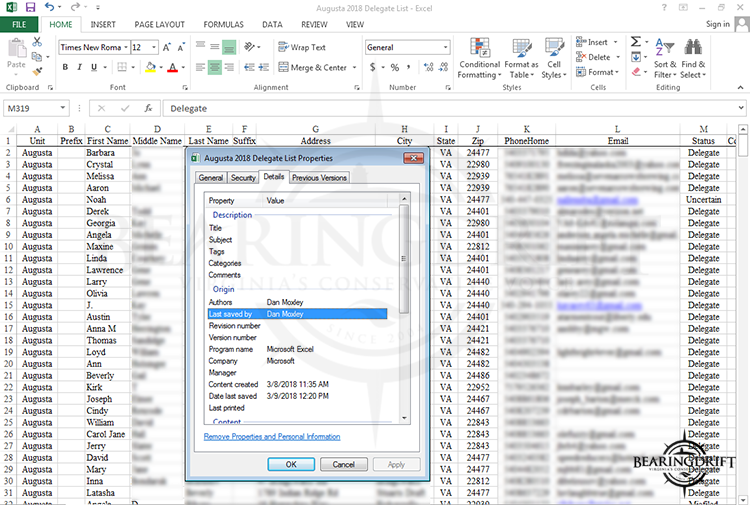By James Harrison
Congressional candidates for the U.S. House race recently received delegate lists for the 6th District Convention that will be held on May 19. Those lists were released by Chairman Scott Sayre on April 6 to each of the congressional candidates.
According to Excel metadata embedded one of the delegate lists [1], Dan Moxley appears to have created the Augusta County delegate list on March 8, 2018, after their mass meeting was canceled on March 3, per the party call. Moxley modified the list on March 9, 2018.
At some point, the delegate list was given to Chairman Scott Sayre in accordance with Sec. V (B) of the official Sixth District Convention call [2]. The metadata lists Moxley as the only creator or editor of the file. This list, along with all the delegate lists from each committee within the 6th District, were distributed on April 6.
Dan Moxley serves as the current secretary of the Augusta County GOP (recently elected), and is the former unit chairman.
While this doesn’t seem like interesting information at first, it must be stated that Dan Moxley also works directly for one of the congressional candidates: Cynthia Dunbar.
According to the most recent FEC report [3], Dan Moxley was paid $1,500 per month in January, February, and March 2018, with the March payment disbursed on March 12. This means that Dan Moxley created the Augusta County delegate list on March 8, 2018, while simultaneously being paid by the Cynthia Dunbar congressional campaign.
The metadata from the list can be seen here:

Just to be sure, the list was crosschecked on a third party platform and the metadata shows the same information: Dan Moxley, author, March 8.
Thus, it appears that a paid member of the Dunbar congressional campaign had access to a delegate list a month before the rest of the congressional candidates had access to the same list.
The Augusta list is extremely valuable. In 2018, 496 Augusta residents filed for the convention and 465 were accepted. The list contains phone numbers for 444 accepted delegates and email addresses for 360.
To protect the privacy of delegates, the list in question will not be released to the public, however every campaign can confirm the metadata for the Augusta list by looking at what was received by Scott Sayre.
This poses a potential conflict of the RPV State Party Plan. Dunbar and others are subject to party ethics rules, most notably those found in Article VII, Section J of the RPV State Party Plan [4], which provides:
SECTION J. Ethical Conduct
- Voting members of official committees shall exercise their best efforts to conduct the business of the Party in good faith, with reasonable care, skill, and diligence. They shall hold as confidential all party information, documents, and communications clearly designated as confidential of for limited dissemination or use by adopted policy of the committee. They shall refrain from participating in unethical activity, diminishing the dignity and credibility of the the Party.
- Recognizing that not all possible conflicts represent an actual conflict of interest, voting members of the State Central Committee and District Committees shall voluntarily disclose, in writing, any known potential or actual conflicts of interest to all members of the official committee on which they serve in a timely manner after becoming aware of such conflict.
The same prohibitions of subsection (1) against bad faith, unethical conduct, and leaking confidential information also apply to other voting members of official committees.
Additionally, Moxley could find himself in serious hot water if he failed to disclose his conflict of interest under subsection (2).
There exists no reasonable scenario in which one campaign’s staff member should have access to this data. Someone else on the committee should have been the one to create the Augusta County delegate list in order to avoid any conflict of interest.
Something has clearly gone wrong when Moxley’s name makes it into a file he never should have had access to ahead of time due to his employment by a congressional candidate.
Would advance receipt of this data trigger a federal in-kind contribution disclosure requirement? [5] While putting an exact value on data can be tricky, a list this size is probably worth more than the 43 cents per name needed to reach the $200 in-kind reporting threshold.
There was no such disclosure on Dunbar’s congressional campaign April 15 filing [6].
Dunbar already faces one federal investigation [7] over unreported in-kind contributions. Sayre might face another investigation [8] over botched campaign finance filings. This unreported in-kind contribution could add a third FEC complaint and investigation to the stack.
This is not the first difficulty the Dunbar campaign has had with regard to conflicts of interest. Questions have been raised as to her role on the payroll of Chairman Sayre’s company [9] as she began planning her campaign as early as May 2, 2017, Dunbar also paid half of the district’s 2017 budget [10] to her friends as speaking fees.
This could be a problem for Scott Sayre as well. He could face removal from his position under the State Party Plan with a majority vote of his fellow members if a staff member for one congressional campaign had advanced data before the other campaigns.
Paid campaign staffers should never have been handling confidential delegate data [11] more than a month before other competitors would receive it.
At this point, RPV is risking big trouble with a potential appeal from the floor unless party leadership steps in to ensure this convention is conducted in a neutral way.
Dunbar currently serves on the Republican Party of Virginia’s State Central Committee as RNC National Committeewoman, a position which also makes her an ex-officio member of the Sixth District GOP under its bylaws. Dunbar is a voting member of both official committees.